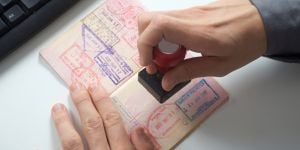
How do you stay connected with your friends and family after your move to The Netherlands? Do you choose a new Dutch phone subscription or use Roam like at Home? And what about non-EU citizens? In this guide, you'll know the best ways to stay in contact with your loved ones living at home.
Whether you're still planning your big move to The Netherlands or whether you're already living here as an expat, you've probably struggled with this question: how do I stay in touch with my friends and family at home? In this article, we will try to answer this question through our experience as a comparison website for mobile phones, and the experiences of other expats.
Your 5 choices of staying connected
Okay, we are not trying to overwhelm you with an endless possibility of choices. But there's multiple options if you want to stay connected. The best option for you depends on how the length of your stay, in what ways you want to stay connected and if you want to be able to call Dutch phone numbers as well.
We try to make your choice easier by adding the pros and cons of each option, and by adding a few expat experiences as well.
1. Use Roam like at Home (only for EU-citizens)
Maybe you're familiar with the term Roam like at Home. It's in effect in all EU-countries and it means you can still use your existing phone plan wherever you are, considering you're staying in the European Union. This way, you can stay connected to those people you're missing. Call your mom, Skype with your friends or use WhatsApp... All within your existing phone plan. There are some conditions though:
- You can't always use your full data plan. Providers often give you a fair use policy. Ask your provider what their fair use policy is for using your data plan abroad.
- There's a EU law that forbids you to use more data abroad than in the country where you purchased your subscription / SIM card. Your provider measures this for a period of 4 months.
An example:
Do you have a data plan with 50 GB of data? There's a good possibility you can only use half of your data plan. Or are you used to having an unlimited data plan? Then it might be better to choose a Dutch subscription, also with unlimited data.
2. Buy a local prepaid SIM-card
Mostly need your SIM-card to be available for other (Dutch) phone numbers? Or do you need a Dutch phone number to sign up for something, but you don't really need to call anybody in The Netherlands? Then buying a local prepaid SIM-card is your best choice!
I still use my Irish SIM card, but I also have a Dutch SIM card. It's not in my phone but I use it for things like Picnic/insurance/forms, etc.
Michelle, Ireland
Pros:
- a clear overview of the costs: you pay up front and if you're out of minutes or data, you simply can't use it anymore
- cheap (considering you only use your SIM-card for the necessities)
- you don't need any Dutch documents, you can simply buy a SIM-card in any supermarket
Cons:
- not practical if your stay is long, since you have to manually upgrade your credit if you have used everything
- expansive if you want to use your data every day
- you will need a phone that is SIM-lock free
3. Get a Dutch SIM only subscription
A great alternative to a prepaid SIM-card, is to get a subscription with a SIM-card. The difference? You pay a fixed price per month and you get a pre-arranged number of calling minutes and/or data. This means that every month, your data is renewed. Perfect if you want to use data in The Netherlands to your hearts desire.
Pros:
- cheap options, because there's lots of providers to choose from
- monthly terminable (note: not all contracts are monthly terminable)
Cons:
- you will need a phone that is SIM-lock free
- in some cases, you will need a Dutch bank account
4. Get a Dutch phone subscription
If you don't have a phone yet or your contract has just ended, you can opt for a Dutch subscription including a phone. This way, you don't need to worry about any SIM-lock on your phone. However: you will need a Dutch bank account in most cases. Especially if you order the phone online. Having a Dutch bank account is practical if you're staying for at least 1 year, since it's also required for a lot of other things!
Pros:
- you don't need to worry about a SIM-lock free mobile phone
Cons:
- you're tied to a contract for at least 1 year
- in most cases, you will need a Dutch bank account
5. Use both Roam like at Home and a Dutch SIM-card
This is being done by a lot of expats: using both your own subscription with Roam like at Home and using a Dutch SIM-card. You can either do this by switching your 2 SIM-cards in your phone or choosing a dual SIM phone (a phone in which you can place 2 SIM-cards at the same time).
A few weeks after my arrival in The Netherlands, I bought a dual-sim phone so I could keep my own number as well.
- Veronika, Hungary
If you just need a Dutch phone number because - for example - it's required of you to sign up for something, you can opt for a prepaid solution. Do you also want to call a lot to Dutch phone numbers? Then choose a subscription, either with or without a phone.
Pros:
- you're easily in contact with your friends at home and with the Dutchies
Cons:
- if you don't have a dual-SIM phone, you have to switch SIM-cards manually
Many EU expats think they don't need a Dutch number, but the people who call them are charged with international fees. You definitely need a local number so that the locals can call you without breaking the bank.
- Eva, Greece
Choosing the subscription that fits you best
Have you found an option that's best fitting for you? Great! Now all you have to do, is make sure to get the best fitting subscription as well. You can do that by comparing different mobile providers.
We do our best to provide accurate and up to date information. However, if you have noticed any inaccuracies in this article, please let us know in the comments section below.








